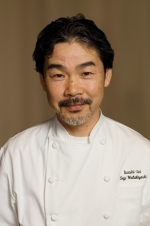Interview with Chef Seiji Wakabayasi of Bushi-Tei - San Francisco
Antoinette Bruno:When and why did you start cooking? What inspired you to pursue cooking professionally?
Seiji Wakabayashi:I started cooking when I was 15 years old. My mom had a small restaurant so I just watched her to learn. She made her customers happy and that inspired me to be a chef.
AB: Where have you worked professionally as a chef?
SW: I worked with Wolfgang Puck at Spago for 2 years in the late nineties. I was also a sous chef at Café Del Rey and worked at West Channel Bar and Grill, and Kihachi in Tokyo.
AB: Would you recommend culinary school to aspiring cooks? Do you hire chefs with and without a culinary school background?
SW: I didn’t attend school but instead began my career at a French restaurant in Japan. I don’t think it’s necessary.
AB: Who are some of your mentors? What have you learned from them?
SW: From Wolfgang Puck I learned quality control; he taught me to start everything from scratch every day and to throw out everything you don’t use that day so everything will be at its freshest. Kihachi taught me how to be a free spirit and run a kitchen without any borders.
AB: What question gives you the most insight to a cook when you’re interviewing them for a position in your kitchen? What sort of answer are you looking for?
SW: I ask them about their techniques and see how they handle basic but important tasks. I have them make a simple vinaigrette, a buerre blanc sauce, or a veal stock. I also like to see if they can julienne vegetables.
AB: What advice would you offer young chefs just getting started?
SW: It’s important to understand how each ingredient tastes in all its various forms, from raw to cooked in many different ways.
AB: Is there any ingredient that you feel is particularly under appreciated or under utilized?
SW: Ginger is a medicine and my secret ingredient. I add it to soups to intensify the flavor.
AB: What are a few of your favorite flavor combinations?
SW: Seared foie gras with kabocha squash.
AB: What’s your most indispensable kitchen tool?
SW: Metal chopsticks, to place things with accuracy.
AB: What are your favorite cookbooks?
SW: The French Laundry Cookbook by Thomas Keller.
AB: Where to you like to go for culinary travel? Why?
SW: Spain, because Spanish chefs are at the top of the world and I want very much to try their food, and France.
AB: What languages do you speak?
SW: Japanese and Spanish
AB:What are your favorite restaurants off-the-beaten-path in your city?
SW: Nova for Mediterranean flat bread, butternut squash, and goat cheese. It’s open late so I can go after work.
AB: Which person in history would you most like to have dinner with?
SW: My mother because she never got a chance to eat my food.
AB: What is your philosophy on food and dining?
SW: I want to make people happy!
AB: If you weren’t a chef what do you think you’d be doing?
SW: Maybe I’d be a carpenter.
AB: What does success mean for you? What will it look like for you?
SW: I would like to have another restaurant at some point.






